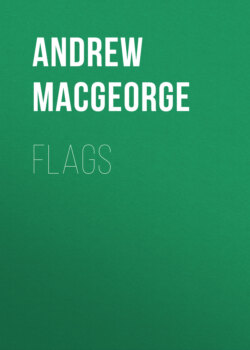Читать книгу Flags - Andrew Macgeorge - Страница 3
На сайте Литреса книга снята с продажи.
ОглавлениеOn that morning when the news arrived from South Africa of the disaster at Isandlana, there was general mourning for the loss of so many brave men; but there was mourning also of a different kind,—with some perhaps even deeper—for the loss of the colours of the 24th Regiment. And yet, after all, it was only a bit of silk which had been lost, having on it certain devices and inscriptions—a thing of no intrinsic value, and which could be replaced at a cost merely nominal. But it possessed extrinsic qualities which could be measured by no money value, and every one felt that the loss was one to redeem which, or rather to redeem what that loss represented, demanded, if necessary, the putting forth of the strength of a great nation. And so, when it was found that the colours never had been really lost—that they had been saved by brave men who had laid down their lives in defending them—there was throughout the nation a feeling of intense relief that national honour had been saved; a feeling of rejoicing far beyond what was evoked by the news of the capture of the Zulu king and the termination of the war. So at sea. In our great wars in which the navy of Great Britain played so prominent a part, we became so accustomed to see the flag of the enemy bent on under our own ensign, that if an exceptional case occurred where the position of the two flags was reversed, it went home to the heart of every loyal subject with a pang which the loss of many ships by storm and tempest would not have produced.
Yet how few of us know what the national colours are, what the Union is, what the Royal Standard is. Not to speak of civilians, are there many officers, in either the army or the navy, who, without a copy before them, could accurately construct or describe the flag of the nation under which they fight, or tell what its component parts represent? I doubt it. And, after all, they would not be so much without excuse, for even at the Horse Guards and the Admiralty, there is some confusion of ideas on the subject. I have before me "The Queen's Regulations and Orders for the Army," issued by the Commander-in-chief, in which flags which can be flown only on shore are confounded with flags which can be flown nowhere but on board ship. Yet the subject is really an interesting one, and, connected as it is with national history, it is deserving of a little study.
Flags are of many kinds, and they are put to many uses. They are the representatives of nations; they distinguish armies and fleets, and to insult a flag is to insult the nation whose ensign it is. We see in flags, says Carlyle, "the divine idea of duty, of heroic daring—in some instances of freedom and right." There are national flags, flags of departments, and personal flags; and as signals they are of the greatest value as a means of communication at sea.
